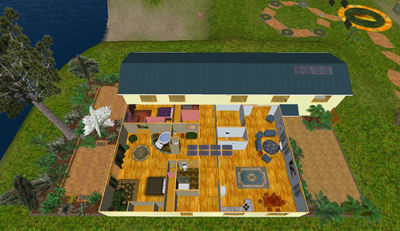Research
Contents
Open Education Practices 2011
One of our current projects (2011) is looking at how the Graduate Certificate in Tertiary Learning and Teaching can re-developed as an open access program, using a four-tier model of funding:
- open and free
- reduced fee for facilitation, but no assessment services or accreditation
- reduced fee for assessment services and accreditation, but no facilitation
- full student fee for facilitation, assessment services and accreditation
Literature Review
The first part of the project has been to carry a literature review, looking at OER and open education practices: http://ia600209.us.archive.org/14/items/Oer-LiteratureReview2011/OerPractices_2.pdf
The aim of the literature review was to inform the development of the open version of the GCTLT. It has resulted in this research question which we will address as we trial the open GCTLT in 2012:
How can an open facilitated course using a four tier model of funding be designed so it is sustainable and attracts revenue?
Development of open courses
The second stage of our project is to develop criteria that will guide the development of the open courses within the GCTLT program. At the moment it is difficult to find concrete guidelines on the nitty gritty of OER course development. There are a number of documents that talk about general principles of OER, how to develop OER strategy within organisations, as well as advice on how to develop OER objects.
- OPAL What constitutes good open educational practices?: http://www.oer-quality.org/wp-content/uploads/2011/03/OEP-const-elements.pdf
- OPAL OEP Guide: http://www.oer-quality.org/wp-content/uploads/2011/03/OPAL-OEP-guidelines.pdf
- Open courses as research, learning and engagement Siemens and Cormier: http://net.educause.edu/ir/library/pdf/ERM1042.pdf
- A basic guide to open educational resources (OER) Neil Butcher: http://www.icde.org/filestore/Resources/Handbooks/COLUNESCOBasicguidetoOER.pdf
- David Wiley OER Life Cycle: http://wikieducator.org/OER_Handbook/educator_version_one/Introduction/OER_life_cycle
Information about how to develop open courses comes mostly from e-learning and general education literature. However, there are a few sources that talk about the practicalities of open course design and implementation.
- Creating open educational resources The Open University: http://openlearn.open.ac.uk/mod/oucontent/view.php?id=397777&direct=1
- UNESCO/COL Guidelines for OER in Higher Education: http://oerworkshop.weebly.com/guidelines-for-oer-in-higher-education.html
- MOOC Guide: http://moocguide.wikispaces.com/0.+Home+Intro+to+MOOC
Criteria for the development of the GCTLT in an open format
- Each course uses constructivist principles of teaching and learning.
- Designed to encourage sharing and collaboration
- Designed to support experiential learning
- Think how to support open communication - how do we facilitate this with self-directed learners?
- How we facilitate sharing and collaboration for learners doing courses as self-directed participants?
- Each course provides an effective learning experience
- How do we know that this aim has been achieved?
- Easily accessible.
- Designed to meet needs of facilitated and self-directed learner.
- Designed for people with hearing and vision impairment provides audio and text descriptions for non-information information, provides text descriptions to support audio format
- Designed for people who do not have access to mouse
- Uses variety of technical modes and formats, use open formats where possible.
- How do we build digital capability so that people have the digital literacy skills to participate in these courses?
- Do we build in a portfolio approach, especially for self-directed learners applying for RPL?
- Easy for self-directed learners to enrol - streamline processes especially for foreign students, including "enrol now" button
- Sustainable
- Uses OER model, incorporating the OER cycle
- Content will need to be checked so that appropriate licence is used
- Only use resources that can be shared openly? IE need to think about how/if to use readings etc that cannot be shared in open environment
- How do we manage the facilitation of self-directed learners who interact with the course outside enrolment dates.
- Culturally competent
- Think about use of images. Do we only use white, European images? When we use "alternative" images, are we supporting stereotypes?
- How so we support translation of our courses?
- Support students to develop an appropriate digital identity.
- What about students who do not want to work in an open digital environment? EG. they do not want to be tracked online.
- The overarching "umbrella" for the open GCTLT is that it is a quality program, both in terms of its content, presentation and delivery.
- What is our quality control mechanism?
- Development takes place in the open environment so that the general community can give feedback as part of quality control.
Next Steps
The next step of this project is to examine the GCTLT as it stands.
1. FLEXIBLE LEARNING
2. ASSESSING AND EVALUATING FOR LEARNING
3. CONSTRUCTING COURSES TO ENHANCE LEARNING (Not yet in an open online environment)
4. GAINING FOUNDATION SKILLS FOR LEARNING AND TEACHING
5. ASSESSING FOR PRIOR LEARNING
6. WRITING FOR JOURNAL PUBLICATION (Not yet in an open online environment)
7. EDUCATION FOR SUSTAINABILITY
8. FACILITATING ONLINE
9. SPECIAL TOPIC
How we need to adapt, edit and change the courses so they meet the criteria.
- What works and what doesn't work in terms of pedagogy?
- What works and what does not work in terms of basic design features?
- Are we going to use a template so the courses are more consistent? If yes, how will it look?
- How do we design the courses so they stand alone for self-directed learners, as well as facilitated students?
'Mind the Gap': Video Resources for Teaching and Learning 2011
http://mindthegap2011.wikispaces.com
http://akoaotearoa.ac.nz/projects/mind-gap-developing-digital-repository-resources-support-reflective-teaching-and-learning
Open Education Practices: A User Guide for Organisations 2010
http://en.wikibooks.org/wiki/Open_Education_Practices:_A_User_Guide_for_Organisations
Digital Information Literacy 2009
Second Life Education New Zealand 2009
Two members of EDC, Leigh Blackall and Sarah Stewart were core members of the Second Life Education New Zealand project in 2009. This national research project looked at how Second Life could be used in tertiary education, focusing on foundation interview skills and midwifery education.
Information about the project can be found on the project blog [1], including the evaluation report [2].
Lesson plans, supporting information and resources for the Foundation Interview Skills in Second Life project [3]
Lesson plans, supporting information and resources for the Virtual Birthing Unit and Normal Birth Scenario [4]

